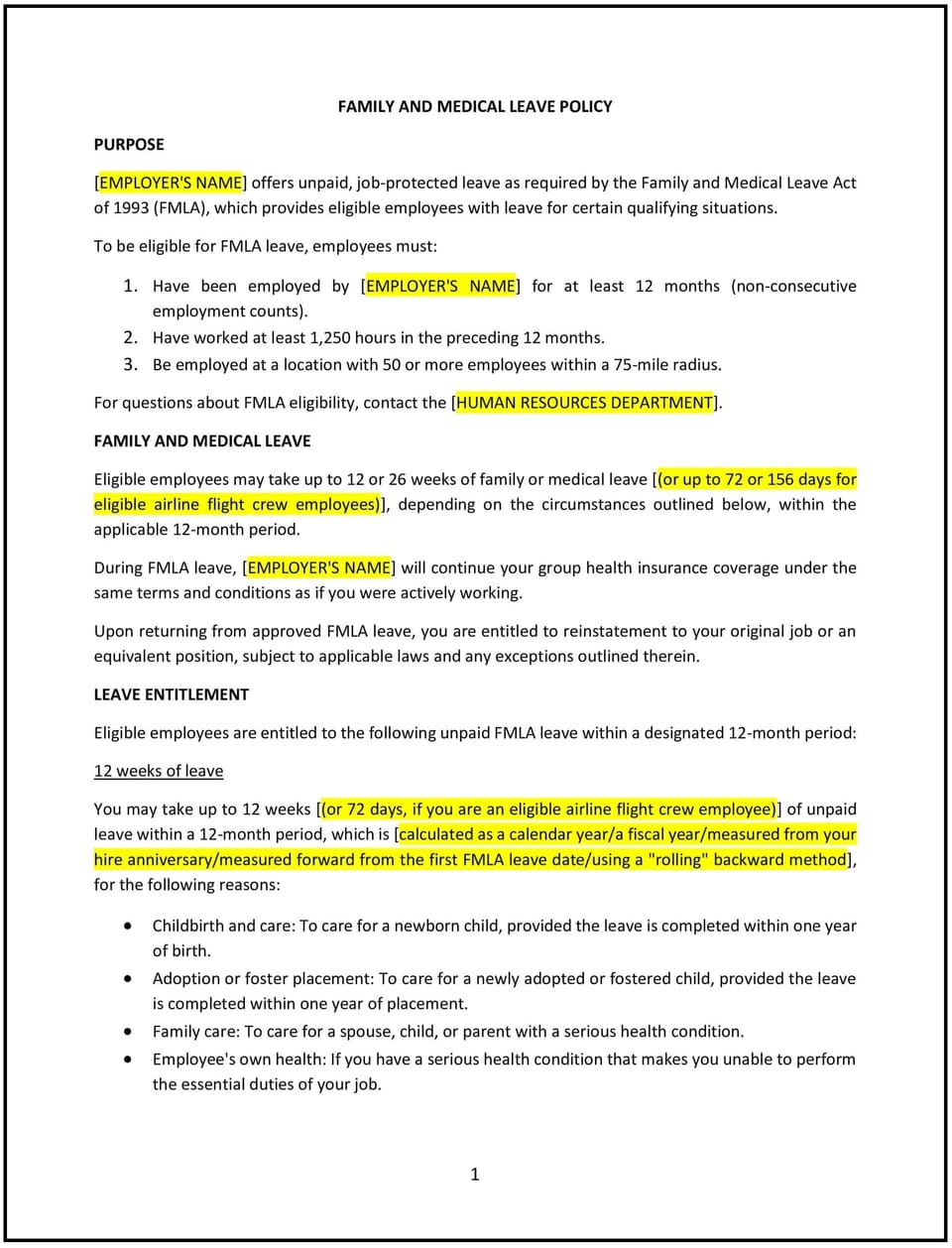Family and medical leave policy (Delaware): Free template

Family and medical leave policy (Delaware)
A family and medical leave policy helps Delaware businesses provide eligible employees with job-protected leave for specified family and medical reasons. This policy outlines eligibility criteria, leave duration, and procedures for requesting and managing leave in compliance with the Family and Medical Leave Act (FMLA) and Delaware state laws.
By implementing this policy, businesses can support employees’ well-being, ensure legal compliance, and foster a supportive workplace culture.
How to use this family and medical leave policy (Delaware)
- Define eligibility: Specify which employees qualify for family and medical leave, such as those meeting minimum employment duration and hours worked requirements.
- Outline covered reasons: List qualifying reasons for leave, including the birth or adoption of a child, a serious health condition, or caring for a family member with a medical condition.
- Establish leave duration: Clarify the amount of leave available, such as up to 12 weeks of unpaid leave within a 12-month period, in line with FMLA and Delaware laws.
- Explain request procedures: Provide instructions for employees to request leave, including required notice periods and supporting documentation.
- Maintain job protection: Reassure employees that they will be reinstated to their original or equivalent position upon returning from leave.
- Ensure confidentiality: Emphasize that all medical information related to leave requests will be handled confidentially and shared only as necessary.
Benefits of using this family and medical leave policy (Delaware)
This policy offers several benefits for Delaware businesses:
- Supports employee well-being: Allows employees to address personal or family health needs without fear of losing their job.
- Ensures compliance: Aligns with FMLA and Delaware-specific leave laws, reducing the risk of legal disputes.
- Improves employee morale: Demonstrates the company’s commitment to supporting employees during challenging times.
- Enhances retention: Helps retain valued employees by providing a supportive and flexible workplace.
- Promotes consistency: Standardizes leave management practices, ensuring fair and equitable treatment for all employees.
Tips for using this family and medical leave policy (Delaware)
- Communicate the policy clearly: Ensure all employees are aware of their rights and responsibilities under the policy.
- Provide training: Train managers and HR personnel on how to handle leave requests in compliance with FMLA and Delaware laws.
- Track leave usage: Use systems to monitor leave requests and ensure accurate record-keeping.
- Offer resources: Provide employees with access to additional support, such as employee assistance programs or counseling services.
- Review regularly: Update the policy periodically to reflect changes in FMLA regulations or Delaware-specific leave laws.
Q: Why is a family and medical leave policy important for my business?
A: This policy ensures compliance with FMLA and Delaware laws, supports employees’ personal and family needs, and fosters a positive and supportive workplace culture.
Q: Who is eligible for family and medical leave under this policy?
A: Eligibility typically requires employees to have worked for the company for at least 12 months and completed a minimum number of hours, as outlined in FMLA and Delaware laws.
Q: What types of situations qualify for family and medical leave?
A: Covered reasons include the birth or adoption of a child, a serious health condition affecting the employee or a family member, or specific needs related to military service.
Q: How does the policy protect employees’ jobs during leave?
A: Employees are entitled to return to their original or an equivalent position with the same pay, benefits, and conditions after their leave ends.
Q: How often should this policy be reviewed?
A: This policy should be reviewed annually or whenever changes occur in FMLA regulations, Delaware laws, or company practices to ensure it remains effective and compliant.
This article contains general legal information and does not contain legal advice. Cobrief is not a law firm or a substitute for an attorney or law firm. The law is complex and changes often. For legal advice, please ask a lawyer.


